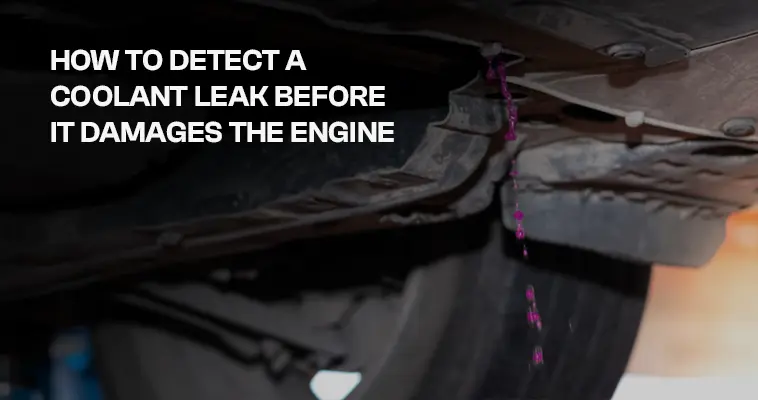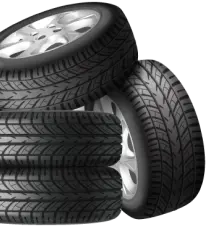The radiator coolant in a car is a liquid mixture—usually made of water and antifreeze—that helps regulate the engine’s temperature. It circulates through the engine and radiator to absorb excess heat and prevent overheating.
When this system is compromised, it can cause significant performance issues or even result in engine failure. One of the most common problems is a car leaking coolant, which often goes unnoticed until significant damage has already occurred.
In this blog, we’ll explore important signs that a car’s radiator may be leaking, why early detection matters, and what steps to take to prevent these issues.
Common Signs a Car’s Radiator Is Leaking Coolant
Knowing the early signs of radiator problems helps prevent engine damage and expensive repairs. Here’s what to watch for:
1. Puddles Under Car
One of the most noticeable signs of a radiator leaking coolant is the presence of puddles or spots under the car. Coolant is typically bright green, orange, or pink, making it relatively easy to identify. If you notice puddles under your car, it’s important to address them. Leaks often stem from cracks in the radiator or damaged hoses, and ignoring them can lead to serious engine problems.
2. Overheating Engine
If the car’s engine temperature gauge frequently rises into the red zone, it may indicate a coolant leak. An overheating engine can lead to damage, including a blown head gasket. If you experience overheating, check coolant levels and inspect the radiator for leaks. Low coolant is one of the common causes, but there are several other car overheating reasons and preventive tips for car owners worth knowing to avoid costly repairs. If you find that the coolant is low, it’s time to seek assistance.
3. Low Coolant Levels
Regularly checking coolant levels can help you detect potential issues early. If you notice that the coolant reservoir is often low and needs frequent refilling, there may be a problem within the cooling system that needs attention.
4. Sweet Smell in the Cabin
Coolant has a distinct sweet smell. If you notice this odour inside the car, it may indicate a leak from the radiator or hoses, allowing coolant to enter the cabin. This should be addressed, as breathing in coolant fumes can be harmful and may point to a serious issue in the cooling system.
5. Engine Warning Light
Modern cars have sensors that monitor engine temperature. If the engine warning light appears on the car’s dashboard, it could point to a problem with the cooling system, such as a radiator leak. Don’t ignore this warning—visit a professional car mechanic near you . Getting help locally makes it easier and more convenient to prevent further damage.
6. Corrosion and Rust
Checking the radiator for signs of corrosion or rust can help spot potential issues early. Green or orange residue around the radiator or hoses may be dried coolant from a leak. This buildup can weaken components and cause further leaks. Regular maintenance is important to prevent this and keep the cooling system in optimal condition.
7. Hissing or Bubbling Noises
Unusual noises coming from the engine compartment can indicate a coolant leak. If you hear hissing or bubbling sounds, it may be due to coolant escaping from a damaged radiator or hose. These noises should not be ignored, as they can signal overheating and other issues.
What Happens if Radiator Leaks Are Ignored?
Ignoring signs of a radiator leaking coolant can lead to engine overheating, which may cause permanent engine damage. This can result in expensive repairs or even the need for a full engine replacement. Car repairs can help you avoid costly damage and maintain optimal function.
How to Prevent Radiator Leaks?
Here are some effective ways to prevent radiator leaks:
- Inspect the cooling system every 10,000 km or during each major service
- Flush and replace coolant every 40,000–50,000 km or every 2 years
- Check hoses and clamps for cracks, bulges, or looseness
- Monitor the temperature gauge regularly for abnormal changes
- Use the correct coolant for your car make and model
Why Choose an Experienced Mechanic for Coolant Leak Repairs?
Coolant leaks can be difficult to find and fix. An experienced mechanic has the skills and tools to identify and repair leaks. They are familiar with car makes and models, ensuring proper parts and fluids are used to maintain engine durability.
- Accurate Diagnosis: Experienced mechanics can identify the exact leak source, saving time and money.
- Quality Repairs: They use advanced tools and manufacturer-approved parts for reliable, long-lasting fixes that protect your engine.
- Maintenance Recommendations: Reliable mechanics offer guidance on cooling system maintenance to help prevent future leaks.
- Safety First: Coolant and radiator repairs can have some risks. A mechanic ensures all repairs are done safely.
Choosing a local mechanic who offers car radiator repair near you ensures reliable service at your convenience, and asking the quick questions to ask your car mechanic that could save money can help you make informed decisions during the process.
Get Your Car’s Radiator Checked Early
Early detection of coolant leaks can save you from costly engine damage. Be alert to warning signs like puddles under your car, engine overheating, low coolant levels, sweet smells inside the cabin, or dashboard warning lights. Regular inspections and servicing can help to prevent major issues.
If you're looking for car repair in Melbourne, BCS Workshop offers advanced computer diagnostics and reliable radiator repair services for all European cars. Contact BCS Prestige today to schedule a cooling system inspection and ensure the engine stays protected.
Contact BCS Workshop today to schedule a cooling system inspection and ensure the engine stays protected.
Frequently Asked Questions
Q: What causes coolant leaks in a car?
A: Coolant leaks can be caused by a variety of issues, including cracked radiators, damaged or loose hoses, worn-out gaskets, corrosion, or a faulty water pump. Regular inspections during car servicing can help catch these problems early.
Q: Can I drive my car with a coolant leak?
A: It is not advisable to drive a car with a coolant leak. Doing so can lead to engine overheating, which may cause severe and costly engine damage. If you suspect a leak, it's best to visit a trusted car mechanic near you immediately.
Q: How do I know if it's coolant or just water under my car?
A: Coolant typically has a distinct sweet smell and a noticeable colour, usually green, orange, or pink. Water alone (from condensation, especially from the AC) is usually clear and odourless. If you’re unsure, a mechanic can perform a pressure test to confirm.
Q: How often should I service my car's cooling system?
A: It’s recommended to inspect the cooling system every 10,000 km or during major car services. Coolant should generally be flushed and replaced every 40,000–50,000 km or every two years, depending on your car’s make and model.









